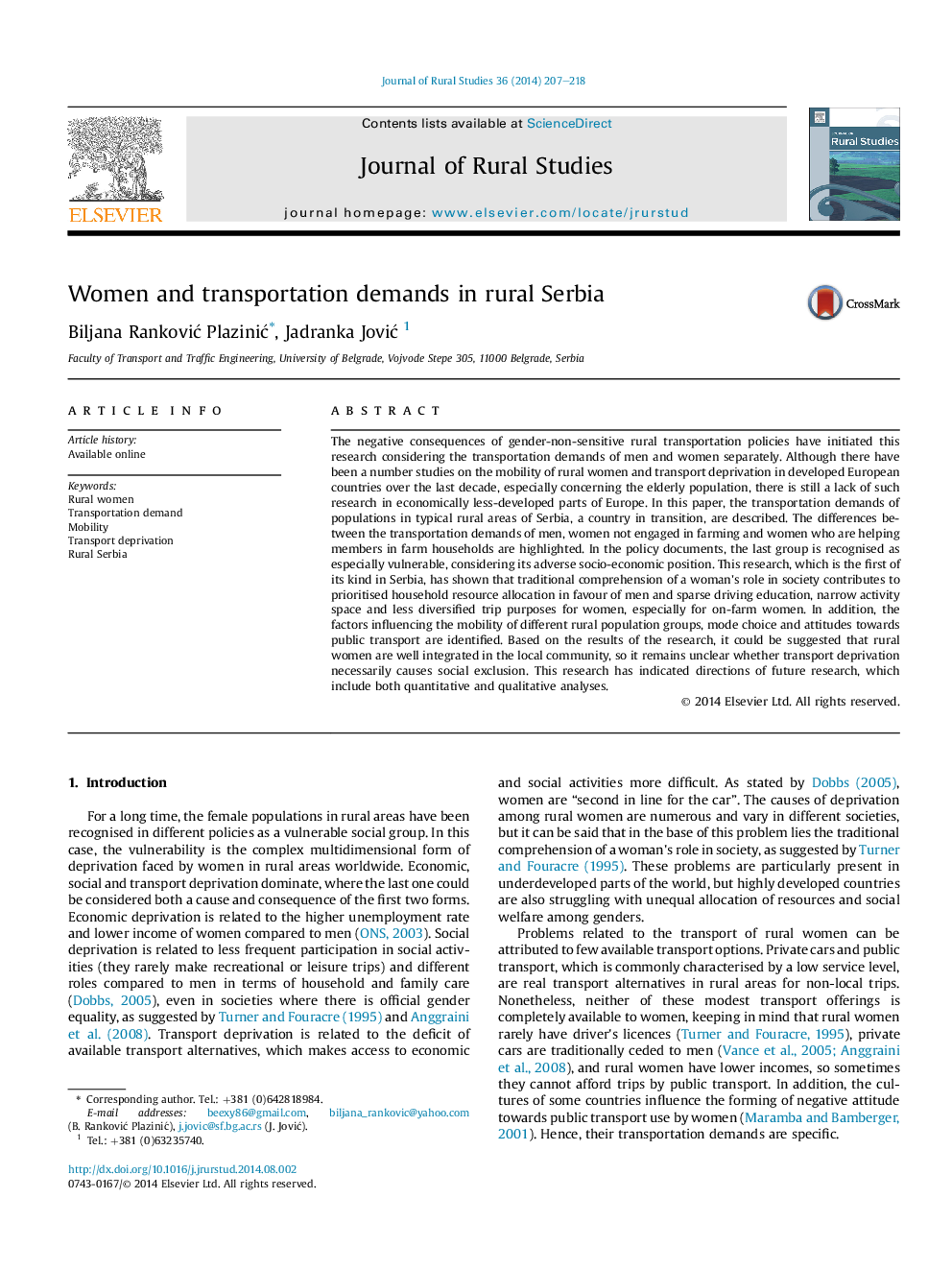| کد مقاله | کد نشریه | سال انتشار | مقاله انگلیسی | نسخه تمام متن |
|---|---|---|---|---|
| 6545745 | 159972 | 2014 | 12 صفحه PDF | دانلود رایگان |
عنوان انگلیسی مقاله ISI
Women and transportation demands in rural Serbia
ترجمه فارسی عنوان
مطالبات زنان و حمل و نقل در روستای صربستان
دانلود مقاله + سفارش ترجمه
دانلود مقاله ISI انگلیسی
رایگان برای ایرانیان
کلمات کلیدی
زنان روستایی، تقاضای حمل و نقل، تحرک، محرومیت از حمل و نقل، روستایی صربستان،
ترجمه چکیده
پیامدهای منفی سیاست های حمل و نقل جنسیتی غیر حساس جنسیتی این تحقیق را با توجه به نیازهای حمل و نقل مردان و زنان به طور جداگانه آغاز کرده است. اگر چه مطالعات متعددی در مورد تحرک زنان روستایی و محرومیت حمل و نقل در کشورهای توسعه یافته اروپا در دهه گذشته، بویژه در مورد سالمندان انجام شده است، هنوز در چنین شرایطی از نقاط کمتر توسعه یافته در اروپا وجود دارد. در این مقاله، خواسته های حمل و نقل جمعیت ها در مناطق روستایی معمولی صربستان، یک کشور در حال گذار، شرح داده شده است. تفاوت بین خواسته های حمل و نقل مردان، زنان نداشتن در زمینه کشاورزی و زنان که به اعضای خانواده های مزرعه کمک می کنند، برجسته شده است. در اسناد سیاست، آخرین گروه به دلیل آسیب پذیر بودن آن، با توجه به موقعیت اجتماعی و اقتصادی نامطلوب آن، شناخته شده است. این تحقیق که اولین نوع آن در صربستان است، نشان داده است که درک سنتی از نقش زن در جامعه، کمک به تخصیص منابع اختصاصی خانوار به نفع مردان و تحصیلات رانندگی کم، فضای فعالیت محدود و اهداف سفر کمتر برای زنان است. به ویژه برای زنان مزرعه. علاوه بر این، عوامل موثر بر تحرک جمعیت های مختلف جمعیت روستایی، انتخاب حالت و نگرش نسبت به حمل و نقل عمومی مشخص می شود. بر اساس نتایج تحقیق، می توان گفت زنان روستایی در جامعه محلی به خوبی ادغام شده اند، بنابراین هنوز معلوم نیست که محرومیت از حمل و نقل ضرورتا منجر به انزوای اجتماعی می شود. این تحقیق جهت تحقیقات آینده نشان داده شده است که شامل هر دو تجزیه و تحلیل کمی و کیفی است.
موضوعات مرتبط
علوم زیستی و بیوفناوری
علوم کشاورزی و بیولوژیک
جنگلداری
چکیده انگلیسی
The negative consequences of gender-non-sensitive rural transportation policies have initiated this research considering the transportation demands of men and women separately. Although there have been a number studies on the mobility of rural women and transport deprivation in developed European countries over the last decade, especially concerning the elderly population, there is still a lack of such research in economically less-developed parts of Europe. In this paper, the transportation demands of populations in typical rural areas of Serbia, a country in transition, are described. The differences between the transportation demands of men, women not engaged in farming and women who are helping members in farm households are highlighted. In the policy documents, the last group is recognised as especially vulnerable, considering its adverse socio-economic position. This research, which is the first of its kind in Serbia, has shown that traditional comprehension of a woman's role in society contributes to prioritised household resource allocation in favour of men and sparse driving education, narrow activity space and less diversified trip purposes for women, especially for on-farm women. In addition, the factors influencing the mobility of different rural population groups, mode choice and attitudes towards public transport are identified. Based on the results of the research, it could be suggested that rural women are well integrated in the local community, so it remains unclear whether transport deprivation necessarily causes social exclusion. This research has indicated directions of future research, which include both quantitative and qualitative analyses.
ناشر
Database: Elsevier - ScienceDirect (ساینس دایرکت)
Journal: Journal of Rural Studies - Volume 36, October 2014, Pages 207-218
Journal: Journal of Rural Studies - Volume 36, October 2014, Pages 207-218
نویسندگان
Biljana RankoviÄ PlaziniÄ, Jadranka JoviÄ,
